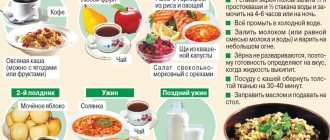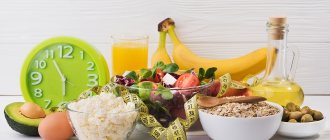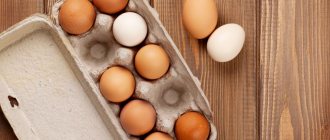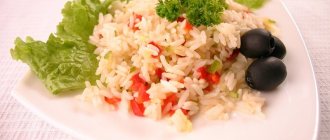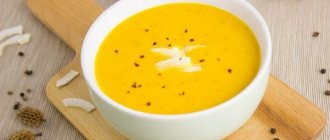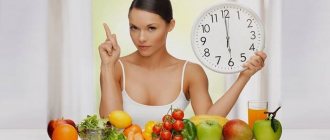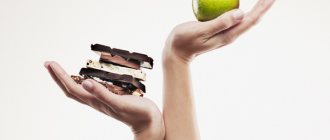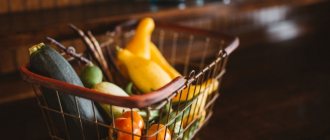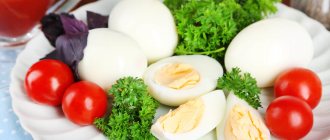A vegetarian diet has become increasingly popular lately. For some reason, it is believed that switching to vegetarianism can relieve excess weight and many health problems. Perhaps this is how stereotypes have developed: if you don’t eat fatty foods, you lose weight; if you exclude meat from your diet, you live longer. Undoubtedly, meat is rich in cholesterol and saturated fats, the excessive consumption of which can harm the body. But the fact is that vegetarianism is not a diet, it is a way of life that entails avoiding food of animal origin. And in order to lose weight, giving up meat alone will not be enough, because people who do not eat it can easily afford sweets, chips, various sauces, and other high-calorie foods. That is why a special diet has been developed that will help you get rid of extra pounds, while observing the principles of vegetarianism. Reviews about this diet are very contradictory, because it has both supporters and opponents who claim that a complete refusal of protein foods will cause irreparable harm to the body. But those who practice vegetarianism as a way of life completely disagree with them.
Varieties and benefits of vegetarianism
Content:
- Varieties and benefits of vegetarianism
- Basic principles and types of vegetarian diet
- Sample menu for a week of vegetarian diet
- Sample menu for a month of vegetarian diet
- Sports vegetarian diet
- Harm and contraindications of a vegetarian diet
- Advantages and disadvantages of a vegetarian diet
- conclusions
Many people think that the vegetarian diet was invented specifically for vegetarians, but this is not entirely true. The fact is that there are several varieties of vegetarianism that prohibit the consumption of one or another food depending on one’s beliefs. For example, vegetarians do not eat exclusively meat, many for humanitarian and ideological reasons. But their diet still includes milk, cottage cheese, eggs and other so-called kill-free products. Nowadays they are also called lacto-vegetarians or lacto-ovo-vegetarians. A stricter veganism excludes absolutely all products of animal origin, including slaughter-free ones. There is also a raw food diet, which allows you to eat raw foods that have not undergone heat treatment, since it is believed that temperatures above 46 degrees are detrimental to enzymes - enzymes that help speed up metabolism. There is also fruitarianism, whose followers eat exclusively fruits.
In any case, the main food of vegetarians is and remains plant foods. Of course, such food is lower in calories and contains the least amount of fat than protein foods. Eating fruits and vegetables has a positive effect on the body, as they are rich in valuable fiber, beneficial minerals and vitamins. Plant foods are good for strengthening the body's immune system. In addition, by giving up animal food you can improve your heart function, cleanse your blood vessels, and improve blood supply to your brain.
This diet will be useful for people suffering from diabetes, as it can help normalize blood glucose levels. Among vegetarians, there are fewer people susceptible to hypertension and cancer. Their risk of developing a stroke or heart attack is also reduced.
In addition, vegetarianism can bring other benefits to the body:
- helps normalize the digestive system;
- cleanses the body of dangerous toxins and harmful waste;
- restores beneficial intestinal microflora;
- improves mood and energizes;
- reduces phosphorus, thus preventing the development of kidney diseases.
Options
Depending on the timing, the following types of vegetarian diet are distinguished:
- For a week. You can lose a maximum of up to 10 kg, but on condition that it is the most strict, that is, only fruits, vegetables and greens are used as food. Portions should be minimal. Physical activity is mandatory.
- For 2 week. The first week you can go on a strict diet, and in the second week you can add dairy products and baked goods to your diet.
- For a month. It is best in this case to alternate 1 day with a strict and gentle diet. To lose weight, you additionally need to exercise regularly.
If you can easily tolerate a vegetarian diet, then you can continue it further. Many people live on it their whole lives. In 2 months you can lose 10 kg, even if you consume dairy products and sweets and flour in moderation.
Depending on the food, the following types of vegetarian diets are distinguished:
- Vegan. Only vegetables, fruits and honey are allowed. Considered strict. Of all the types of vegetarian diets, it is the lowest in calories, so it is not recommended to sit on it for more than half a month.
- Ovo-vegetarian. Vegetables, fruits, honey and eggs are allowed.
- Lacto-vegetarian. The diet includes vegetables, fruits, honey and dairy products.
- Lacto-ovo vegetarian. The diet includes vegetables, fruits, honey, dairy products and eggs. This is a gentle option that replenishes protein deficiency through eggs and dairy products. This ensures that muscle fibers are not damaged due to exhaustion. You are allowed to stay on such a diet until the desired result is achieved.
- Pescetarian. You can eat vegetables, fruits, honey, eggs, dairy products, and fish. You can't only eat meat and poultry.
- Pollotarian. The recommended list of foods includes vegetables, fruits, eggs, dairy products, honey, fish and poultry. Only meat is excluded from the diet.
All of the listed varieties of a vegetarian diet give good results in losing weight and help to establish the normal functioning of all organs and systems.
Basic principles and types of vegetarian diet
A vegetarian diet in its principles is in many ways similar to Christian fasting. Most likely, many have encountered them and know what they mean. The essence of this diet is to avoid eating animal and bird meat, fish and seafood. Her rules are based on a more gentle lacto-ovo vegetarianism, in which dairy products and eggs are allowed. Thus, this principle of losing weight is suitable even for those who have decided to give up meat dishes for the first time. In addition, if it is still very difficult to part with meat, then at first you can create your own menu for 2 weeks, which will include a small amount of it. Then gradually reduce its inclusion in the diet until completely excluded.
Basic rules of a vegetarian diet:
- exclude meat, fish and seafood from the diet;
- do not give up dairy products and poultry eggs to compensate for the lack of vitamin B12;
- eat foods of plant origin: berries, vegetables, fruits, herbs, cereals, nuts, beans, whole grain or bran bread;
- dairy products should contain a small amount of fat;
- use lemon juice or vegetable oil to dress salads;
- during the diet you need to drink at least two liters of pure mineral water without gas;
- reduce to a minimum the consumption of sweet, salty, fried, various types of preserves and marinades.
The duration of such a diet can be 1 week, 2 weeks or even a month. It is not recommended to adhere to the principles of such nutrition for any longer. If after the first week the results are quite satisfactory, then you can limit yourself to this period. If you want to extend the diet, use the two-week nutrition plan.
You need to eat on such a diet three times a day, and for breakfast it is better to set aside time from 7 to 9 am, lunch to be held between 11 and 13 pm, and for dinner leave time from 16 to 18 o'clock. After six o'clock in the evening, eating, as on any other diet, is prohibited. Only a small snack before bed is allowed in the form of any unsweetened fruit or a glass of low-fat fermented milk product. If you really want to eat in between main meals, you can snack on an apple, a small amount of nuts or seeds.
Leaving the diet should also not be abrupt, but gradual. Especially in cases where it lasted more than 2 weeks. To do this, you can first introduce higher-fat dairy products, then you can add fish to your diet. On about the third or fourth day, you can try boiling a small piece of lean meat, preferably chicken, turkey or beef.
It is recommended to repeat this diet no more than once every two months.
There are several types of vegetarian diet. And depending on what results you want to get, you need to choose one or another type of power system:
- lacto-vegetarian diet - allows you to eat dairy and fermented milk products;
- lacto-vegetarian diet - characterized by the addition of only milk to the diet as a source of calcium;
- lacto-ovo-vegetarian diet - a principle of weight loss that allows the use of dairy products and poultry eggs;
- vegetarian diet for athletes - based on a balanced and strict distribution of proteins, carbohydrates and fats;
- vegetarian protein diet - involves consuming large amounts of protein, which is mainly found in dairy products, legumes, seeds, nuts, eggs and so on.
General rules
Avoidance of animal products is beneficial to health, but only if such nutrition is undertaken temporarily.
Let us remember the Christian fasts, which differ in severity and content of permitted foods, but still contain predominantly plant foods. Avoiding animal products is a vegetarian eating style. This has certain advantages:
- bowel function and natural bowel movement improves, as the diet is rich in fiber;
- fiber helps restore intestinal microflora;
- the exclusion of animal fats and the absence of cholesterol in plant foods eliminates the risk of diseases of the cardiovascular system ( atherosclerosis , hypertension );
- weight loss, since plant foods are low in calories, contain a minimum of fat, and such a diet does not cause obesity .
As a temporary measure, this is justified and not dangerous to the body. This diet will be useful for people with increased weight and those suffering from hypertension with a risk of stroke or heart attack . However, the constant exclusion of animal proteins from the diet adversely affects the health, especially of a growing organism.
In order to organize a more or less proper diet and diversify it, it is recommended to still leave dairy products and eggs in the diet. Even vegetarian food comes in several types and you can choose the variety that is more acceptable to you:
- lacto-vegetarian diet - the consumption of dairy and fermented milk products is allowed - sources of vitamin D , protein and calcium;
- A lacto-ovo vegetarian diet includes dairy products and eggs;
- Veganism is a complete rejection of animal products.
A diet for weight loss without meat and fish, provided that the diet includes cottage cheese, feta cheese, cheese, eggs, and fermented milk drinks, is not catastrophic even for teenagers. And with age, the benefits of vegetarianism increase and the diet of older people should be predominantly vegetarian, but must include fish and eggs 2-3 times a week.
The duration of the diet can be from one week to one month. It is better to observe it during the ripening period of seasonal vegetables and fruits. If the results after the first week are satisfactory, limit yourself to this period. For greater results, extend your nutrition plan to two weeks. In any case, it is not recommended to adhere to the principles of such nutrition for more than a month.
The weight loss system requires a mandatory reduction in calories in the diet. With a vegetarian diet, you can lose from 2 to 4 kg per week, but this will depend on the diet (the amount of cereals, bread and flour products in it) and the level of physical activity.
Exiting the diet should be gradual, especially if it lasted a month. First, dairy products with a high percentage of fat content are introduced, then fish is added. By the fourth day of full nutrition, boiled lean meat (chicken, beef, turkey) is added. You can repeat this diet without harm to health after two months.
Eating without meat and dairy products is also a democratic way to lose weight, since fish and seafood remain in the diet, so there will be no acute shortage of protein, vitamins and microelements. Fish and seafood are rich in vitamin D , iodine, they contain essential amino acids , vitamin B12 (mussels, clams, shrimp, pink salmon, and sardines are especially rich in it), but iron may be lacking, especially for women, given the monthly blood loss.
If you choose veganism, you completely exclude meat, fish, dairy products and eggs. In this case, you are not getting animal protein at all, so the body will be deficient in amino acids. In addition, there is a lack of certain vitamins and microelements. In this regard, the question arises, what to replace meat in the diet with? No product can completely replace animal protein, but it is necessary to include protein from alternative plant foods, although it does not fully contain essential amino acids.
These products are:
- Legumes (if you do not eat fish, eggs and milk, these should be included in the menu twice a day).
- Tofu cheese, made from soybeans, which comes in several types, also goes well with other foods and absorbs their flavor. This allows you to prepare a wide variety of dishes.
- Spirulina (full set of amino acids).
- Any nuts, especially pine nuts (contain all amino acids).
- Mushrooms.
- Flax seeds and spinach are very rich in protein.
- Combinations of two products provide a complete set of amino acids: hummus and whole-wheat pita bread, red beans and rice, couscous and lentils, corn dishes (porridge, tortillas, pancakes) and beans, wheat grits with peas (beans).
Secondly, you need to include in your diet:
- Sources of vitamin B12 : seaweed (chlorella, seaweed, spirulina), wheat germ, raw carrots and boiled veil. At the same time, consume foods rich in cobalt, without which the synthesis of this vitamin in the body is impossible: sprouted green buckwheat, corn and bran.
- Zinc: pine nuts, beans, peas, peanuts, wheat, buckwheat, oatmeal and barley.
- Iron: pumpkin, millet, beans, peas, green onions, buckwheat, pearl barley, green vegetables, radishes, beets, zucchini, eggplant, tomatoes, barley and oatmeal, watercress, spinach, parsley, brown rice, persimmon, pomegranate, apples, cherries, plums, strawberries, raspberries, pears, black currants, figs, nuts.
Russian nutritionists do not welcome veganism, believing that a diet without fish and meat, dairy products and eggs is definitely not good for health due to the developing deficiency of vitamins and protein.
- Plant foods do not contain enough vitamin B12 (the only source is algae), so 92% of vegans and 47% of lacto-ovo vegetarians are deficient in this vitamin, without which diseases of the nervous system develop and rapid aging of the brain occurs. Initial manifestations are memory impairment and a tendency to depression .
- A lack of vitamin B12 leads to anemia, since iron from meat and liver is absorbed much better than iron from plant foods. Anemia leads to disturbances in the activity of the heart, fatigue, and menstrual irregularities. There are studies showing a connection between deficiency of this vitamin and Alzheimer's disease .
- Insufficient amounts of iodine, calcium and vitamin D affect the function of the thyroid gland and the skeletal system. Low vitamin D levels are associated with various central nervous system disorders: depression, cognitive impairment.
- Protein deficiency is explained by the fact that, on the one hand, plant protein is less digestible. On the other hand, excess plant fiber further impairs protein absorption. Protein deficiency leads to dysfunction of many organs, muscular dystrophy and decreased immunity .
- There is a deficiency of polyunsaturated fatty acids, which are concentrated mainly in fish and seafood. Chronic lack of them leads to problems with the cardiovascular system.
- Cholesterol must also come from food, as it is necessary for the synthesis of corticosteroids and sex hormones . Limiting its intake from food is justified in the presence of atherosclerosis , although endogenous (synthesized in the body) cholesterol plays a large role in its development.
When following a vegan diet for a long time, you need to make not only adjustments to your diet (mostly this concerns fats and proteins), but also be sure to compensate for insufficient nutrition by taking medications ( vitamin D , injections of vitamin B12 , Magnesium B6 ) and dietary supplements.
In the absence of meat, fish, milk and eggs in the diet, to maintain health, food should contain:
- Plant proteins, which were mentioned earlier.
- High-quality coconut or palm oil (source of saturated fatty acids).
- Flaxseed oil (source of Omega-3 ).
- Olive oil, avocado and nuts (sources of oleic acid ).
Sample menu for a week of vegetarian diet
This menu is approximate, that is, based on it you can create your own weight loss plan. Vegans can remove eggs and dairy from their diet and add more plant-based foods. However, when creating your own menu for the week, you should not increase the portions, since the weight loss system is aimed at reducing the daily calorie intake. Reviews from those who have lost weight say that with the help of such a vegetarian diet you can easily and effortlessly lose up to 4 kg in a week.
Monday:
- 08.00 – 150 grams of buckwheat or oatmeal porridge with milk, 200 grams of any low-fat fermented milk product;
- 12.00 – 200 grams of vegetable soup, 200 grams of fresh vegetables, seasoned with lemon juice or olive oil, a slice of rye or whole grain bread;
- 17.00 – 200 grams of vegetables cooked in a steamer, 150 grams of boiled brown rice.
Tuesday:
- 08.00 – two hard-boiled eggs, a piece of rye or bran bread, a tomato and low-fat cheese;
- 12.00 – 200 grams of celery salad with cheese and apples, seasoned with lemon juice or olive oil;
- 17.00 – 150 grams of zucchini caviar, two medium baked potatoes, two slices of whole grain bread.
Wednesday:
- 08.00 – 150 grams of rice milk soup, two pears, 150 grams of low-fat yogurt without additives;
- 12.00 – 200 grams of soybean soup with tofu, 150 grams of steamed or steamed vegetables, a sesame bun, a small orange;
- 17.00 – 200 grams of stewed mushrooms with onions and vegetables.
Thursday:
- 08.00 – one hard-boiled egg, half a cucumber, parsley, a slice of bran bread, a glass of low-fat fermented milk product;
- 12.00 – two small apples, 200 grams of pepper stuffed with rice and vegetables;
- 17.00 – two small potatoes, boiled in their jackets, 150 grams of boiled green beans, two small tomatoes.
Friday:
- 08.00 – 100 grams of oatmeal with milk, 200 grams of any low-fat fermented milk product;
- 12.00 – 200 grams of lentil and bean soup, cabbage and carrot salad, seasoned with lemon juice or vegetable oil;
- 17.00 – 250 grams of vegetable stew.
Saturday:
- 08.00 – 100 grams of low-fat cottage cheese, 150 grams of low-fat fermented milk product, 100 grams of fresh berries;
- 12.00 – 200 grams of lean borscht, 150 grams of vegetable vinaigrette, one small apple;
- 17.00 – 150 grams of stewed cabbage with mushrooms, two slices of rye or whole grain bread, 200 grams of low-fat fermented milk product.
Sunday:
- 08.00 – 150 grams of low-fat drinking yogurt without additives, one small orange, 150 grams of cottage cheese casserole;
- 12.00 – 200 grams of pearl barley porridge with milk, 150 grams of cauliflower salad and olive oil, 200 grams of tomato juice;
- 17.00 – 200 grams of vegetable casserole with potatoes, 150 grams of asparagus cooked in a steamer.
Menu (power mode)
You need to eat this diet three times a day. If this is not enough and you feel hungry, in between you can have a snack with grapefruit, a small amount of nuts or dried fruits, or a fermented milk drink, if this is included in your chosen diet. When losing weight, you need to limit cereals; you can eat porridge in the first half, preferably at breakfast.
The basis of your diet during the day consists of vegetables, legumes, mushrooms, seaweed, soy products, dairy products and eggs, if you prefer this style of eating. When eating fish, it can be included for lunch or dinner, garnished with vegetables.
Accordingly, if you decide to completely do without animal products this month, the menu will have to be revised. But be sure to take into account that protein of plant origin (legumes, mushrooms, ready-made soy products, nuts, spinach) should be in the diet every day in two meals. It is not advisable to eat after six o'clock in the evening.
| Breakfast |
|
| Dinner |
|
| Dinner |
|
| Breakfast |
|
| Dinner |
|
| Dinner |
|
| Breakfast |
|
| Dinner |
|
| Dinner |
|
Sample menu for a month of vegetarian diet
Those who are confident in their abilities and want to continue their vegetarian lifestyle should turn their attention to a special method for losing weight, focused on a month. You can continue to stick to the previous menu, starting again every week and looping it in this way. Or try creating your own weight loss plan based on the options below.
Breakfast:
- natural freshly brewed coffee, 2 slices of rye bread, 150 grams of fresh berries;
- freshly squeezed fruit juice, 2 slices of whole grain bread, grapefruit or orange;
- 250 grams of low-fat milk and a bran bun;
- pineapple juice, fruit salad, grain bread;
- cottage cheese casserole or 150 grams of low-fat cottage cheese, drinking yogurt without additives, orange;
- natural freshly brewed coffee or tea, carrot casserole, apple, slice of bran bread;
- green tea, oatmeal with kefir or milk.
Dinner:
- 150 grams of stewed beans, a little asparagus, herbal tea;
- rice casserole with broccoli or cauliflower, orange, assorted vegetables with olives, seasoned with lemon juice or vegetable oil;
- 100 grams of rice with stewed vegetables, pear;
- potato casserole with vegetables, salad of fresh vegetables and herbs, fresh juice, apple;
- two slices of rye bread, vegetable salad seasoned with lemon juice or olive oil;
- vegetable carrot cutlet, 150 grams of rice, grapefruit or orange;
- baked green beans, 200 grams of cabbage salad with carrots, unsweetened fruit;
- buckwheat with vegetables, assorted fruits.
Dinner:
- rye bread with vegetables, compote, any fruit;
- 150 grams of low-fat cottage cheese, vegetable juice;
- one hard-boiled egg, 250 grams of low-fat fermented milk product;
- sweet pilaf with prunes and dried apricots, green tea with honey;
- 150 grams of oatmeal, omelette with seaweed, black tea;
- buckwheat porridge with mushrooms;
- potato casserole with asparagus, mushrooms, zucchini and tomatoes.
Menu
It is best to think through the menu for the week in advance. It is balanced and complete. If you follow it exactly, the result of losing weight will be up to 4 kg per week. If you continue the diet for 2 weeks, you will be able to reduce body weight by 10 kg. There will be no harm to health.
Below are examples of menus for every day for strict and gentle vegetarian diets. The latter assumes the presence of additional dairy products and eggs.
Menu examples:
| Day of the week | Menu for a lacto-vegetarian system with the addition of eggs | Strict vegetarian diet menu |
| Monday |
|
|
| Tuesday |
|
|
| Wednesday |
|
|
| Thursday |
|
|
| Friday |
|
|
| Saturday |
|
|
| Sunday |
|
|
You can wash everything down with black, green tea, herbal decoction, juice, compote. It is allowed to drink black coffee from time to time. With a gentle diet, you can drink a glass of kefir an hour before bedtime.
Sports vegetarian diet
Such a diet should be followed by athletes constantly, in other words, become their way of life. It involves eating foods with a high concentration of proteins. These include:
- all legumes: soybeans, beans, beans and peas;
- various seeds and nuts;
- spinach.
For athletes, a lacto-vegetarian or lacto-ovo-vegetarian diet is most suitable, since, in addition to other foods, they allow the consumption of milk, fermented milk products and eggs.
People who play sports need protein as a building material for muscles. Carbohydrates are needed to restore energy that is spent on physical activity. Thus, a sports vegetarian diet should be fairly balanced, and the weekly menu should contain approximately 1000 grams of protein.
This diet will be useful for athletes, as it:
- helps relieve stress and stabilizes the functioning of the nervous system;
- improves digestion and functioning of the gastrointestinal tract;
- charges with energy and vigor, quickly restoring expended strength.
Advantages and disadvantages of a vegetarian diet
Reviews from those losing weight say that in a week of such a diet you can lose up to 4 kilograms of weight, provided that absolutely all principles are followed. As a rule, almost everyone loses 2 kilograms. In addition to this wonderful effect, while losing weight, you can improve your health and cleanse your body, speed up your metabolism, and improve your overall well-being. There are quite a lot of approved products, so it won’t take a lot of time to find and prepare them. Also, a vegetarian diet helps sharpen the mind and has a positive effect on life expectancy.
The disadvantages of a vegetarian diet include the lack of nutrients that enter the body with animal food. Opponents of this lifestyle argue that it is impossible to completely replace them with plant-based products. It will also be difficult for those who cannot imagine their life without meat and seafood to plunge headlong into such a system. But what is most important here is the psychological aspect and desire. After all, as you know, great desires provide great opportunities.
Best materials of the month
- Coronaviruses: SARS-CoV-2 (COVID-19)
- Antibiotics for the prevention and treatment of COVID-19: how effective are they?
- The most common "office" diseases
- Does vodka kill coronavirus?
- How to stay alive on our roads?
Diet without meat and milk - menu for weight loss
A diet without meat and dairy products can be tasty and varied if you know about all its features, prepare it correctly, and know how to combine it with other foods. Recipes for proper nutrition require a minimum amount of products that are available for purchase at any time of the year.
Breakfast
The diet for breakfast can be very varied, including cereals, healthy sandwiches, baked goods, omelettes and others. Let's look at the best of them, which are worth paying attention to when shaping your diet:
- Omelet with tomatoes on kefir;
- Oatmeal and egg;
- Cheesecakes with kefir and eggs;
- Cottage cheese with fruit.
These options can become complete breakfasts, without meat and milk, which will quickly saturate the body, improve its functioning, and fill it with useful ingredients.
Lunches
A meat-free diet for weight loss requires a heartier and more complete lunch, which could satisfy the need for food right up to dinner. The lunch menu might look like this:
- Vegetable soup with egg;
- Buckwheat porridge and scrambled eggs;
- Rice with vegetables, egg.
Dinners
For dinner, predominantly protein foods are always recommended, including on a diet. Eggs, other dairy products, and fish can replace meat and milk. The best options for dinner are:
- Baked fish steak with vegetables;
- Curd casserole and tea;
- Kefir omelette;
- Cheesecakes and tea.
Important! You can choose dinner according to your personal preferences, the main thing to remember is that it should be no later than 3 hours before bedtime.
Snacks
Now we need to figure out what snacks should be for those who don’t eat meat? There are much more options for snacks than for main courses. The following products can quickly quench your appetite:
- Fruits;
- Vegetables;
- Nuts;
- Dried fruits;
- Greenery.
You can choose any option, depending on your personal needs and wishes of the body at the moment.
conclusions
Vegetarianism is a way of life for a fairly large number of people who, for one reason or another, prefer to avoid eating animal products. However, this does not prevent them from looking good, being slim and fit. Based on their diet, a vegetarian diet was invented, which involves eliminating meat products from food for a while. Thanks to this, the body is cleansed, the functioning of the cardiovascular and circulatory systems improves, and it has a beneficial effect on the nervous system. Reviews from many people who have tried this nutrition system indicate that their sleep has improved significantly, nervousness has decreased, and their body feels light and has a significant boost of energy. In addition, with the help of such a diet, you can easily lose several kilograms of excess weight without experiencing the discomfort that usually accompanies various diets.
More fresh and relevant information about health on our Telegram channel. Subscribe: https://t.me/foodandhealthru
We will be grateful if you use the buttons:
How many vegetarians are there in the world?
Today, according to various estimates, there are from 600 million to a billion vegetarians in the world and their number is gradually growing.
Nowadays, there are several directions of vegetarianism, let's look at the features of each of them:
Ovolacto-vegetarianism
Ovolacto-vegetarianism is the most common variant of a vegetarian diet. It involves giving up meat, but does not prohibit the consumption of eggs, milk and other dairy products. This is a liberal type of vegetarianism, and also comfortable from the point of view of social life: on the menu of most restaurants and cafes it is difficult to find dishes without meat, milk and eggs at the same time.
Try it
Lactovegetarianism
Lactovegetarianism excludes the consumption of eggs, while milk and dairy products are allowed. Also, this type of vegetarianism excludes the use of gelatin and rennet, which are created with the participation of animal products.
Veganism
Veganism is the strictest form of vegetarianism and excludes all animal products from the diet. Not only meat, fish, seafood, but also eggs, milk and even honey. Vegans are involved in ethical issues and typically wear only faux leather and fur. They also protest against the use of animals in the entertainment industry.
